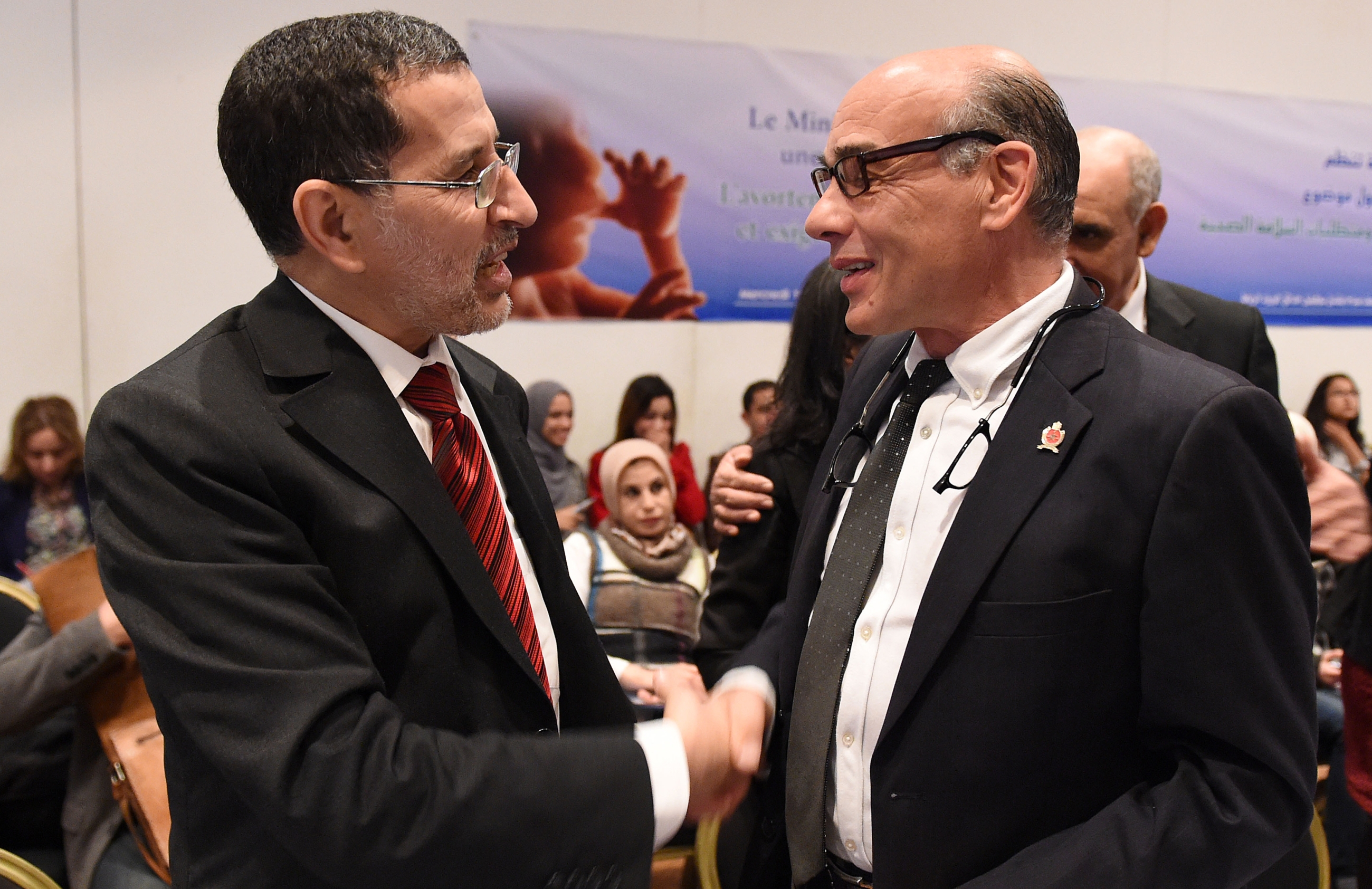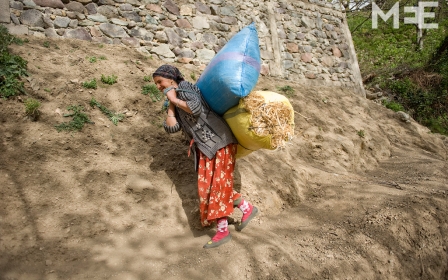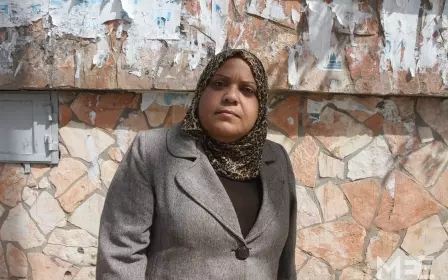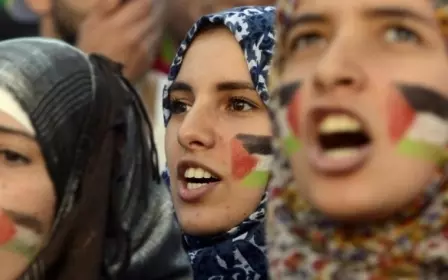Abortion in Morocco: A delicate debate

RABAT - Salma says her first abortion wasn’t that big of a deal when she got it done in Rabat. She had just taken a test and found out she was pregnant, and she asked around among friends and went to a clinic. The procedure took about 15 minutes, she recalls, maybe even less.
“The doctor did it by aspiration, there wasn’t an anaesthetic or anything. It wasn’t necessary,” she told Middle East Eye, sitting on a couch in her apartment in Rabat.
Salma, 44, brings her thumb and finger close together to show the size of the bundle of cells that was growing inside her. “I was pregnant three weeks, maybe a month, the embryo was still very small. I didn’t feel guilty about it. It was an accident and it wasn’t the right time to have children.”
The abortions done by a doctor - she’s had several - cost her about $309 (3000 dirham) each. Salma (not her real name) says she was lucky she could afford it. “But I can imagine that girls with less money will turn to people who are not qualified at all. Or use other methods.”
That remark is the heart of a fierce but delicate debate going on in Morocco right now. By orders of King Mohamed VI himself - it is said that it’s the first time he has spoken out on the subject - the kingdom’s restrictive abortion law is under revision.
Reality in Morocco
Abortion in Morocco is only permitted if the health of the mother is in danger, according to article 453 of the penal code. In March, however, King Mohamed VI ordered the ministers of Islamic Affairs and Justice to come up with a proposal for a new law after talking to Islamic scholars and human rights organisations.
His decision was welcomed by many. “Morocco’s penal code on abortion is very restrictive; the law is not fair to women,” Moroccan Health Minister Houssaine Louardi recently told the Associated Press. “It doesn’t take into account the reality that Moroccans live in these days - there is an urgent need to revise this law.”
Dr Chafik Chraibi, a long-time activist against illegal abortion, plays a key role in the debate. Chraibi was relieved of his duty as chef in the maternity hospital Les Orangers in Rabat in February, after he appeared on French TV speaking about the subject. That re-sparked the abortion debate, which has been going on in Morocco on and off for years.
In his office, behind an oak wood desk, Chraibi told MEE of his everyday encounters with pregnant women who are suicidal and socially excluded, or who just gave birth and disposed of their newborn in a dumpster; women who had an abortion done by an untrained midwife, an unskilled doctor or even by themselves, outside a house on a chair. They suffer heavy bleeding, infections, psychological problems.
“I’ve been doing this for 30 years now,” Chraibi said. “All that time, things have not really changed.”
According to Chraibi’s non-profit organisation, the Moroccan Association for the Fight Against Clandestine Abortion (AMLAC), every day 600 to 800 women have an abortion in Morocco, which amounts to at least 220,000 illegal procedures every year. That seems high, as it would mean that of the 8.29 million women between the ages of 15 and 44, at least one in 38 would have had an abortion in 2014.
Chraibi admits the estimation is hard to verify. “There is research on Rabat and Salé, and in that area at least 50 illegal abortions are done every day. We extrapolated that to the whole of Morocco. Our estimation is in line with that of the Moroccan Association for Family Planning and the World Health Organisation.”
Permitted in schools of Islam
Abortion is a very delicate subject in Moroccan society, which is trying to find a balance between modernising on the one hand, but staying true to its traditional and religious values on the other. “Yet there is nothing in the Qu’ran that prohibits abortion,” said Chraibi.
Although most countries in the Middle East-North Africa region have restrictive laws, Islam doesn’t exclude abortion, sociology professor Abdessamad Dialmy told MEE. For Dialmy, it all depends on which Sunni doctrine you choose to follow.
“Morocco follows the Maliki school in general, which forbids abortion. But the Hanbali and Shafii schools permit it up to the 42nd day and Hanafi even after four months,” Dialmy said.
Dialmy gives the example of Tunisia, where abortion was legalised in 1973. At that time it was a predominantly Maliki country, like Morocco. “Yet Habib Bourguiba chose to follow the Hanbali school for this particular subject. And in 2004 Morocco changed its family law, partly according to the Hanafi doctrine.”
Far more than a religious discussion, the debate is a social one. “An unmarried pregnant woman in Morocco will think: God will forgive me, but people won’t,” Dialmy explained.
That is why, according to Dialmy, the discussion should also be about sex outside marriage, which is also illegal. The biological father by law can’t be the juridical father if a couple is not married.
“That means the child will have no real identity,” Dialmy said. “If you legalise sex outside marriage so the biological father is also the juridical father, you take away the main reason for abortions.”
In case of incest or rape
But that is not likely to happen. Minister of Justice Mustafa Ramid is currently leading a thorough revision of Morocco’s criminal law. He recently stated that two things will not be legalised: the breaking of the fast in public during Ramadan, and sex outside marriage. By default, most abortions will remain illegal in the future.
Dr Chraibi thinks the new draft law will include rape, incest and fetal malformation as grounds for legal abortion, which are factors in about five to 10 percent of the cases, he estimates. The health of the mother is in danger in another five to 10 percent of abortions.
“It means that even under the new law, at least 80 percent of all abortions will be illegal. What will we do in those cases?” Chraibi asks.
That is partly why some human rights activists think that the current discussion is not the right one. It shouldn’t be about the fight against illegal abortion, but about the freedom of choice for women, says Ibtissame Lachgar of the Alternative Movement for Individual Freedoms (MALI), a small group of activists. She has been advocating individual freedom for years.
“Humans rights shouldn’t be dependent on a region, colour of your skin or religion. They are universal. A woman’s body is hers,” she told MEE.
Lachgar said it’s not a good “first step” to legalise abortion in cases of incest and rape.
“If the new law is passed, should all women who want an abortion claim to have been raped? Nonsense.”
Abortion has become a business in Morocco, she told MEE. Doctors can ask whatever price they want, sometimes up to 30,000 dirhams, because women have nowhere else to turn. This needs to end, Lachgar said.
“People who say women will have sex randomly just because abortion is legal, have no idea what they are talking about,” Lachgar told MEE. “No woman has an abortion for fun.”
Middle East Eye propose une couverture et une analyse indépendantes et incomparables du Moyen-Orient, de l’Afrique du Nord et d’autres régions du monde. Pour en savoir plus sur la reprise de ce contenu et les frais qui s’appliquent, veuillez remplir ce formulaire [en anglais]. Pour en savoir plus sur MEE, cliquez ici [en anglais].




